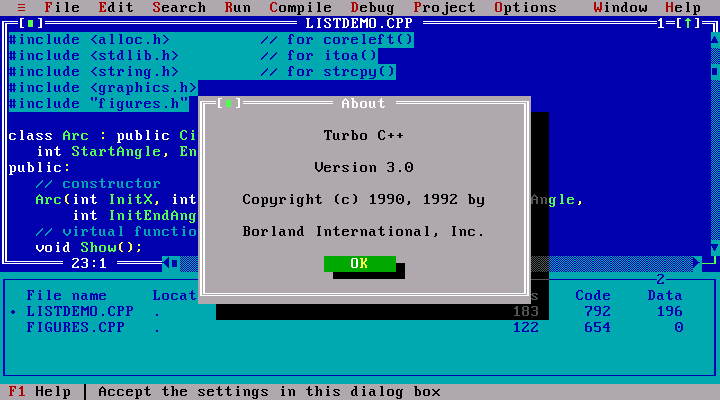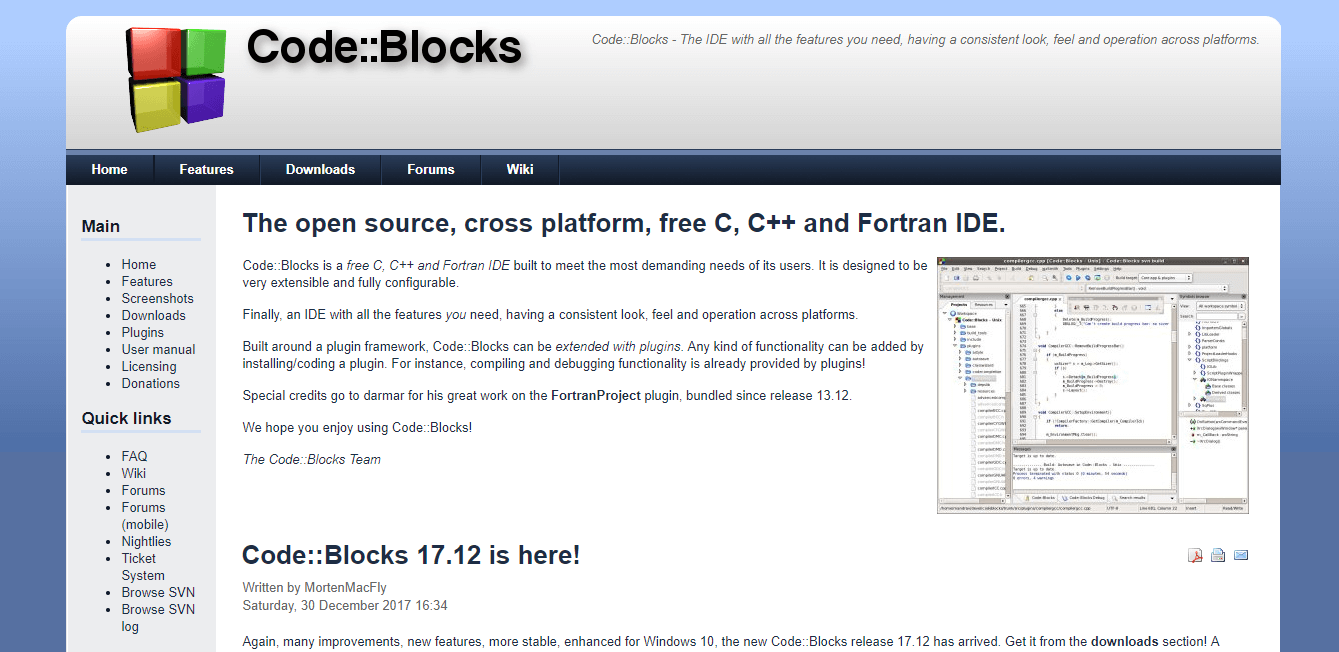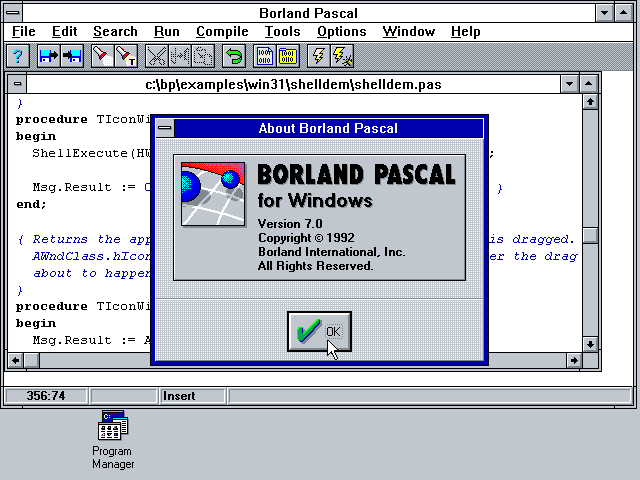Turbo C Library Windows 10

On the Windows operating system, both the library path and PATH environment variables are represented by the PATH. For InfoSphere Information Server engine and ASB Agent processes to detect changes in the environment variables, the changes must be made at the system level and the InfoSphere Information Server engine must be restarted. Installing a C library means specifying to interested software (eg. A compiler) the location of two kinds of files: headers (typical extensions.h or.hpp) and compiled objects (.dll or.lib for instance). Turbo C is an Integrated Development Environment and compiler for the C programming language from Borland. First introduced in 1987, it was noted for its integrated development environment, small size, fast compile speed, comprehensive manuals and low price. In May 1990, Borland replaced Turbo C with Turbo C.
I have been using a software named Turbo C for quite some time for my study purposes as i am a student. I used it on windows 8.1. But since i updated my laptop to windows 10, there's been an issue. I can install Turbo C without any problem but it doesn't starts. I double-click on it but it doesn't starts.
| Developer(s) | Borland |
|---|---|
| Initial release | May 1990 |
| Stable release | 2006 / September 5, 2006 |
| Operating system | Microsoft Windows |
| Type | IDE |
| License | Freeware (Explorer) Proprietary (Professional) |
| Website | www.turboexplorer.com (2006) |

Turbo C++ is a discontinued C++ compiler and integrated development environment originally from Borland. It was designed as a home and hobbyist counterpart for Borland C++. As the developer focused more on professional programming tools, later Turbo C++ products were made as scaled down versions of its professional compilers.
History[edit]
Borland Turbo C++[edit]
The first release of Turbo C++ was made available during the MS-DOS era on personal computers. Version 1.0, running on MS-DOS, was released in May 1990. An OS/2 version was produced as well. Version 1.01 was released on February 28, 1991,[1] running on MS-DOS. The latter was able to generate both COM and EXE programs and was shipped with Borland's Turbo Assembler compiler for Intel x86 processors. The initial version of the Turbo C++ compiler was based on a front end developed by TauMetric (TauMetric was later acquired by Sun Microsystems and their front end was incorporated in Sun C++ 4.0, which shipped in 1994). This compiler supported the AT&T 2.0 release of C++.
Turbo C++ 3.0 was released in 1991 (shipping on November 20), and came in amidst expectations of the coming release of Turbo C++ for Microsoft Windows. Initially released as an MS-DOS compiler, 3.0 supported C++ templates, Borland's inline assembler, and generation of MS-DOS mode executables for both 8086real mode and 286protected mode (as well as the Intel 80186.) 3.0 implemented AT&T C++ 2.1, the most recent at the time. The separate Turbo Assembler product was no longer included, but the inline-assembler could stand in as a reduced functionality version.
Soon after the release of Windows 3.0, Borland updated Turbo C++ to support Windows application development. The Turbo C++ 3.0 for Windows product was quickly followed by Turbo C++ 3.1 (and then Turbo C++ 4.5). It's possible that the jump from version 1.x to version 3.x was in part an attempt to link Turbo C++ release numbers with Microsoft Windows versions; however, it seems more likely that this jump was simply to synchronize Turbo C and Turbo C++, since Turbo C 2.0 (1989) and Turbo C++ 1.0 (1990) had come out roughly at the same time, and the next generation 3.0 was a merger of both the C and C++ compiler.
Starting with version 3.0, Borland segmented their C++ compiler into two distinct product-lines: 'Turbo C++' and 'Borland C++'. Turbo C++ was marketed toward the hobbyist and entry-level compiler market, while Borland C++ targeted the professional application development market. Borland C++ included additional tools, compiler code-optimization, and documentation to address the needs of commercial developers. Turbo C++ 3.0 could be upgraded with separate add-ons, such as Turbo Assembler and Turbo Vision 1.0.
Version 4.0 was released in November 1993 and was notable (among other things) for its robust support of templates. In particular, Borland C++ 4 was instrumental in the development of the Standard Template Library, expression templates, and the first advanced applications of template metaprogramming. With the success of the Pascal-evolved product Delphi, Borland ceased work on their Borland C++ suite and concentrated on C++Builder for Windows. C++Builder shared Delphi's front-end application framework but retained the Borland C++ back-end compiler. Active development on Borland C++/Turbo C++ was suspended until 2006 (see below.)
Version 4.5 was announced on March 20, 1995.[2] New features include multimedia QuickTour, five new games (Turbo Meteors (an Asteroids-like game), Turbo Blocks, Turbo Cribbage, Turbo 21, Turbo Mah Jongg) with corresponding source codes. It includes the ObjectWindows Library (OWL) 2.5, AppExpert, ClassExpert, Object Components Framework.
Borland Japan Turbo C++[3][edit]
Version 4.0J supports DOS for PC-9801 and PC/AT (DOS/V). It includes Turbo Debugger 4.0. IDE uses XMS memory. Project manager supports linking OBJ/LIB libraries, integration with Turbo Assembler 4.0J external assembler.
Version 5.0J was announced on 1996-07-23.[4] Based on Borland C++ 5.0J, this version includes IDE supporting Windows 95 and NT 3.51, and can compile 16-bit software. It includes ObjectWindows Library 5.0, Borland Database Engine, Visual Database Tools.
Borland Turbo C++ Suite[edit]
This version includes Borland C++Builder 1.0, Turbo C++ 4.5 for Windows 3.1, Turbo C++ 3.0 for DOS. Later release replaces C++Builder 1.0 with Borland C++BuilderX Personal Edition.[5]
Turbo C++ 2006[edit]
It is a single language version of Borland Developer Studio 2006 for C++ language,[6] originally announced in 2006-08-06,[7] and was released later on 2006-09-05 the same year with Turbo Explorer and Turbo Professional editions.[8] The Explorer edition was free to download and distribute while the Professional edition was a commercial product.
In October 2009 Embarcadero Technologies discontinued support of all Turbo C++ 2006 editions. As such, the Explorer edition is no longer available for download and the Professional edition is no longer available for purchase from Embarcadero Technologies. Turbo C++ 2006 was succeeded by C++Builder 2007 before Embarcadero's acquisition of CodeGear and dropping support, and official Turbo C++ 2006 page has later redirected a visitor to C++ Builder 2010.
Freeware releases[edit]

Turbo C++ v1.01 was released on 2002-02-21 by Inprise Corporation.[9]
Legacy software[edit]
- Turbo C++ v1.01 and Turbo C v2.01 can be downloaded, free of charge, from Borland's Antique Software website.
- Turbo C 3.0 (DOS) was included in the Turbo C Suite 1.0, which is no longer sold by Borland.
- Even now, many schools and colleges in India continue to use Turbo C++ instead of using modern compilers.[10][unreliable source?]
See also[edit]
References[edit]
- ^'Software Delivery & Testing - Micro Focus Community'. Community.borland.com. Retrieved 2017-05-02.
- ^BORLAND SHIPS TURBO C++ 4.5 - Upgrade Combines Learning Tools with Latest C++ Technologies
- ^ボーランドが送り出した C/C++の歴史
- ^32ビット対応C/C++開発システム Turbo C++ 5.0J for Windows 95 & Windows NT
- ^Borland Turbo C++ Suite – New User
- ^The Turbo Editions FAQ
- ^Borland's Developer Tools Group Announces Plans to Rev Up Classic Turbo
- ^The Developer Tools Group of Borland Software Announces the Immediate Availability of the New Turbo Products
- ^Borland Developer Network Home Museum
- ^'Why you shouldn't be using Turbo C++'.
External links[edit]
- Borland International Inc. page: Turbo C++ 4.5
- Borland Japan Online page: TC++4.0J for DOS, TC++5.0J for Windows
- Borland Software Corporation page: Turbo C++ Suite, Turbo C++ 2006
The PlaySound function plays a sound specified by the given file name, resource, or system event. (A system event may be associated with a sound in the registry or in the WIN.INI file.)
Syntax
Parameters
pszSound
A string that specifies the sound to play. The maximum length, including the null terminator, is 256 characters. If this parameter is NULL, any currently playing waveform sound is stopped.Three flags in fdwSound (SND_ALIAS, SND_FILENAME, and SND_RESOURCE) determine whether the name is interpreted as an alias for a system event, a file name, or a resource identifier. If none of these flags are specified, PlaySound searches the registry or the WIN.INI file for an association with the specified sound name. If an association is found, the sound event is played. If no association is found in the registry, the name is interpreted as a file name.
hmod
Handle to the executable file that contains the resource to be loaded. This parameter must be NULL unless SND_RESOURCE is specified in fdwSound.fdwSound
Flags for playing the sound. The following values are defined.Value Meaning SND_APPLICATION The pszSound parameter is an application-specific alias in the registry. You can combine this flag with the SND_ALIAS or SND_ALIAS_ID flag to specify an application-defined sound alias. SND_ALIAS The pszSound parameter is a system-event alias in the registry or the WIN.INI file. Do not use with either SND_FILENAME or SND_RESOURCE. SND_ALIAS_ID The pszSound parameter is a predefined identifier for a system-event alias. See Remarks. SND_ASYNC The sound is played asynchronously and PlaySound returns immediately after beginning the sound. To terminate an asynchronously played waveform sound, call PlaySound with pszSound set to NULL. SND_FILENAME The pszSound parameter is a file name. If the file cannot be found, the function plays the default sound unless the SND_NODEFAULT flag is set. SND_LOOP The sound plays repeatedly until PlaySound is called again with the pszSound parameter set to NULL. If this flag is set, you must also set the SND_ASYNC flag. SND_MEMORY The pszSound parameter points to a sound loaded in memory. For more information, see Playing WAVE Resources.
SND_NODEFAULT No default sound event is used. If the sound cannot be found, PlaySound returns silently without playing the default sound. SND_NOSTOP The specified sound event will yield to another sound event that is already playing in the same process. If a sound cannot be played because the resource needed to generate that sound is busy playing another sound, the function immediately returns FALSE without playing the requested sound.
If this flag is not specified, PlaySound attempts to stop any sound that is currently playing in the same process. Sounds played in other processes are not affected.
SND_NOWAIT Not supported.
Note Previous versions of the documentation implied incorrectly that this flag is supported. The function ignores this flag.SND_PURGE Not supported. SND_RESOURCE The pszSound parameter is a resource identifier; hmod must identify the instance that contains the resource. For more information, see Playing WAVE Resources.
SND_SENTRY Note Requires Windows Vista or later. If this flag is set, the function triggers a SoundSentry event when the sound is played.
SoundSentry is an accessibility feature that causes the computer to display a visual cue when a sound is played. If the user did not enable SoundSentry, the visual cue is not displayed.
SND_SYNC The sound is played synchronously, and PlaySound returns after the sound event completes. This is the default behavior. SND_SYSTEM Note Requires Windows Vista or later. If this flag is set, the sound is assigned to the audio session for system notification sounds. The system volume-control program (SndVol) displays a volume slider that controls system notification sounds. Setting this flag puts the sound under the control of that volume slider
If this flag is not set, the sound is assigned to the default audio session for the application's process.
For more information, see the documentation for the Core Audio APIs.
Return value
Returns TRUE if successful or FALSE otherwise.
Remarks
The sound specified by pszSound must fit into available physical memory and be playable by an installed waveform-audio device driver.
Turbo C Library Windows 10 64-bit
PlaySound searches the following directories for sound files: the current directory; the Windows directory; the Windows system directory; directories listed in the PATH environment variable; and the list of directories mapped in a network. If the function cannot find the specified sound and the SND_NODEFAULT flag is not specified, PlaySound uses the default system event sound instead. If the function can find neither the system default entry nor the default sound, it makes no sound and returns FALSE.
Turbo C Library Windows 10 Versions
If the SND_ALIAS_ID flag is specified in fdwSound, the pszSound parameter must be one of the following values.
| Value | Description |
|---|---|
| SND_ALIAS_SYSTEMASTERISK | 'SystemAsterisk' event. |
| SND_ALIAS_SYSTEMDEFAULT | 'SystemDefault' event. |
| SND_ALIAS_SYSTEMEXCLAMATION | 'SystemExclamation' event. |
| SND_ALIAS_SYSTEMEXIT | 'SystemExit' event. |
| SND_ALIAS_SYSTEMHAND | 'SystemHand' event. |
| SND_ALIAS_SYSTEMQUESTION | 'SystemQuestion' event. |
| SND_ALIAS_SYSTEMSTART | 'SystemStart' event. |
| SND_ALIAS_SYSTEMWELCOME | 'SystemWelcome' event. |
The SND_ASYNC flag causes PlaySound to return immediately without waiting for the sound to finish playing. If you combine the SND_MEMORY and SND_ASYNC flags, the memory buffer that contains the sound must remain valid until the sound has completed playing.
Examples
The following example plays a sound file:
The following example plays a sound-file resource:
The following example plays a system-event sound:

The following example is equivalent to the previous example, but uses an identifier for the system event:
The following example plays the sound for an application-specific alias in the registry:
The following example stops playback of a sound that is playing asynchronously:
Turbo C Library Windows 10 Pro
Requirements
Minimum supported client | Windows 2000 Professional [desktop apps only] |
Minimum supported server | Windows 2000 Server [desktop apps only] |
Header | Mmsystem.h (include Windows.h) |
Library | Winmm.lib |
DLL | Winmm.dll |
Unicode and ANSI names | PlaySoundW (Unicode) and PlaySoundA (ANSI) |
See also
